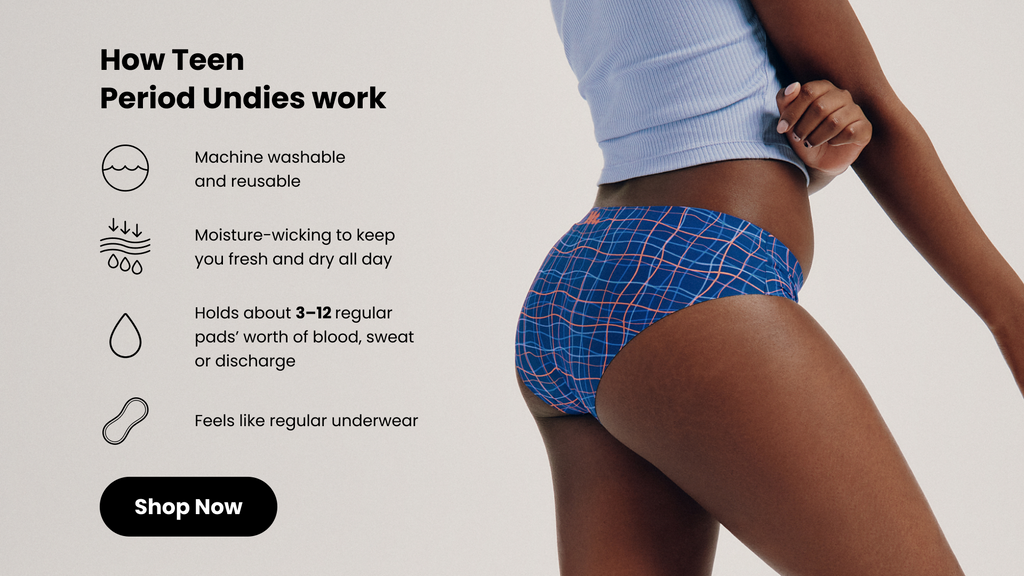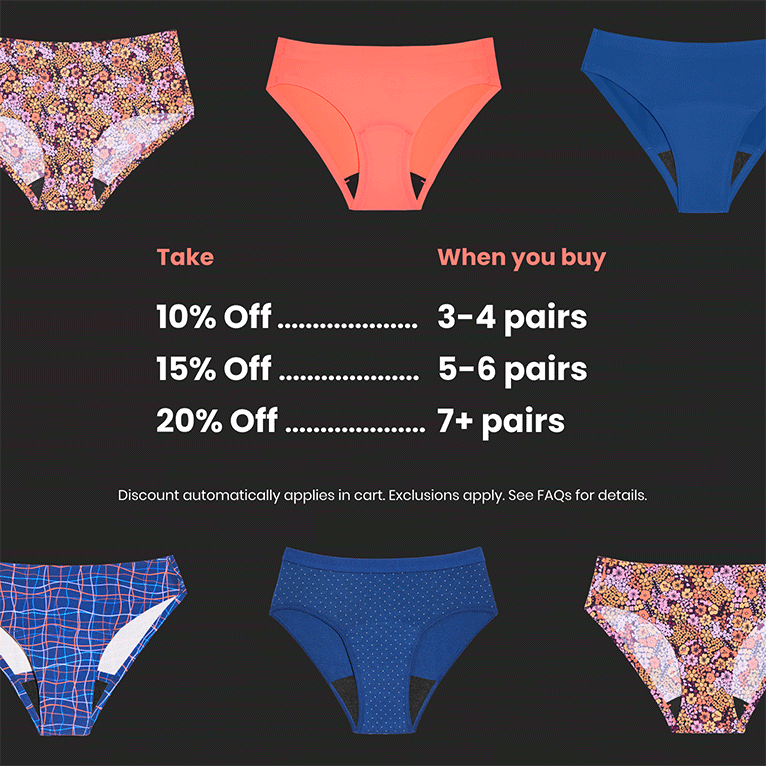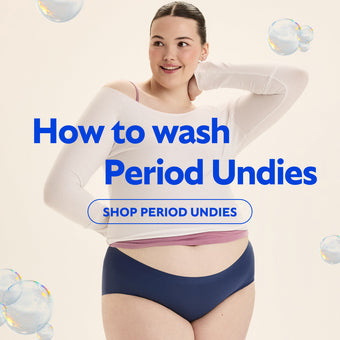Being new to the period world can be pretty intimidating. Your child's body is going through a ton of changes and it can be challenging. As they get used to it, they'll get to know their body and their flow and notice the signs and nuances of your their personal cycle.
Paying attention to their body and getting to know their period symptoms is incredibly beneficial. Your tween might not experience each symptom and the severity will be different for everyone, but hopefully they will begin to understand their own menstrual cycle and have a better idea of when their period might start. They may also have some period symptoms that aren't listed and that’s totally okay. If it’s severe and uncomfortable, talk to their doctor!
Further reading: Learn more about PMS with our survival guide.

Here are 7 signs your child's period is coming (PMS symptoms):
1) Cramps
Menstrual cramps is one of the signs your child's period is JUST around the corner. They usually start 1-2 days before and can last for 2-3 days. Cramps are the most common symptom of menstruation.
Abdominal cramps are different for everyone. Some don’t even experience them (SO LUCKY), but others could be so bad that it interferes with their daily life. Your child should talk to an adult before taking any over-the-counter medication, but it should help! And if the cramps are severe, talk to their doctor to figure out other options.
2) Food Cravings
One of the surefire signs someone's period is incoming is that they'll start to crave junk food. A few days before their period comes, they may notice an increased appetite and an acute desire for salty or sweet foods.
The body requires extra energy during the menstrual cycle, so an increase in appetite is not only totally normal, but important to fuel their period. Just keep an eye out for eating too much sugar, as eating a lot of junk food can also increase the severity of period cramps.
Read more: What they should eat on their period to help ease period pain.
3) Bloating and Gas
If your tween is complaining that their jeans feel a little bit tighter right before their period, that's to be expected. Bloating is caused by water retention and can make us feel gassier than usual. It's a tad uncomfortable, but eating healthy foods, and not too much salt, sugar, and caffeine can help these period symptoms. Exercising can also help, too!
4) Mood Swings
This one can be HARD. Does your child get extremely irritated by things that usually wouldn’t bother them days before their period? Welcome to premenstrual syndrome (PMS)! They might experience this a week before getting their period, or just a few days before. Allow them to feel and cry if they have to. And remember: This too shall pass.
If you're ever concerned about how down they're feeling when they're menstruating, talk to a medical professional. Severe PMS is also called Premenstrual Dysphoric Disorder (PMDD) and can be regulated with the help of a doctor.
Pro tip: Exercising increases your endorphins. They make the body feel good and have a positive outcome for your overall mood. It can be hard when your child is feeling tired, but just simply walking can help them feel better. Read more about why your tween or teen should exercise before or during their period.

5) Breaking Out
It's really normal to breakout in advance of getting a period. Our bodies go through a lot when they're gearing up for a period, which means hormones are all out of whack. Premenstrual symptoms like breakouts are par for the course, and nothing to be ashamed about. In any case, here are a few of our tips to prevent period acne.
6) Fatigue
Who else feels super sluggish right before their period? This is an extremely common symptom that we get. Your hormones are to blame...again!
It’s probably the last thing they want to do, but exercising will actually help your child. Like we mentioned above, being active increases your endorphins, so their mood and energy will be boosted naturally.
7) Breast Tenderness and Swelling
Get your teen's most supportive bra ready! This will only be brief, but it’s a major sign that someone's period is on its way. Their breasts might feel bigger and heavier, and they will be tender. This will go away a day or two after the bleeding starts.

How to be Prepared for Your Child's Period
So, once you notice these signs, you will want to make sure your child is prepared for what’s about to happen. Here are a few tips and tricks to make sure you are ready for when their period comes to town:
Tracking their period
This is an easy way to help them know when their period is coming. It can also help them understand what is going on with their body, like when they're ovulating. There are many apps you can download that can help your teen track their symptoms and cycle. Or they can do it the old school way, and mark it in their calendar.
Read more about our period tracker app reviews on managing cycles here. Or download our free period tracker template here.
Period proof underwear
These will be a MAJOR life saver! Teens can start to wear period-proof underwear or leakproof activewear when they see the signs their period is coming. Say goodbye to embarrassing leaks, and hello unstained jeans and bedsheets! Check out our Leakproof Underwear selections, and say goodbye to leak anxiety for good.
Period emergency kit
This is something every menstruator needs, especially if it's their very first period! You can easily just throw it in their bag or purse, so if they get their period while at school or out, or recognize the signs their period is coming, they won’t have to scramble. Here's our guide to building a period emergency kit.
How to Answer Frequently Asked Questions from Your Teen
Why do I get a period every month?
Your period is a sign that you're ovulating, or releasing an egg from one of your ovaries each month. When you ovulate, you also release some blood and other fluids into your uterus. This blood and fluid create the lining of the uterus where an egg will implant if fertilized. If no egg is fertilized during this time, then the uterine wall breaks down and sheds through your vagina as menstrual blood flow. Download our free period guide (link) to learn more about how the menstrual cycle works and what to expect when your period starts.
When does menstruation start?
The average age to get a first period is 12.5. Menstruation starts when the uterine lining is shed. It occurs when an unfertilized egg is released from the ovary and travels down through the fallopian tubes. This happens every month and is the culmination of the four phases of the menstrual cycle; the follicular phase, the ovulation phase, the luteal phase and the menses phase. It takes about a month to go through the entire cycle - the average is 28 days, but when you get your first period, your cycle length is likely to be irregular and may not be as predictable for the first few years.
How much blood comes out?
The amount of blood that comes out when we menstruate varies from person to person and cycle to cycle. The average amount of blood that comes out during a period is around two to three tablespoons. A single pair of Kt by Knix medium absorbency teen period underwear can absorb up to 3 teaspoons, that's three pads or tampons worth, of blood. It's normal for your period to vary, but if you're worried about heavy bleeding or irregular periods, talk with your doctor. (If you need a refresher on how to use a tampon, we have one.)
Further reading: Does caffeine help period cramps?
How often should I get a period?
The average number of days in a menstrual cycle is 28 days — but that doesn't mean every person's cycle is exactly the same. Some folks have cycles as short as 21 days, while others have them as long as 35 days.
How do I make my first period come faster?
Some periods are regular and predictable, while others can be erratic. If you'd like your first period to hurry up and come faster, unfortunately there's not much you can do. But if you already have your period, read this blog post for a list on things you can do to stimulate the flow for your next period.
Disclaimer: The blog writers at Kt are not medical professionals, and give this advice based on their own research and experience. If you have further questions or concerns, speak to a trusted medical professional.




